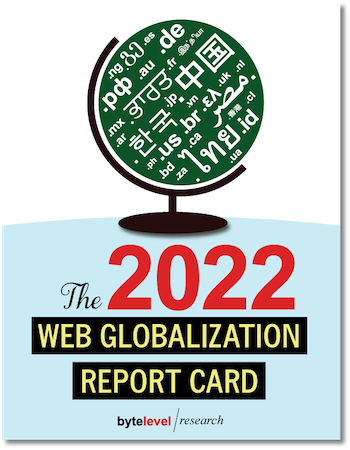I’m pleased to announce the publication of the 2022 Web Globalization Report Card.
This is the 18th annual edition of the Report Card, and it reflects another difficult year. And yet there is much to be optimistic about as we look ahead.
But let’s first look at the top 25 global websites:
- Wikipedia
- Airbnb
- Nestlé
- Philips
- Spotify
- Adobe
- IKEA
- Netflix
- Uber
- Amazon
- Microsoft
- Booking.com
- Deloitte
- Apple
- DHL
- KPMG
- Volvo Cars
- NIVEA
- Canon
- Nikon
- Tinder
- Intel
- Ford
- 3M
Wikipedia supports more than 300 languages by means of a global template that is extraordinarily lightweight and flexible. The website aptly illustrates the importance of using one global design to support all languages.
Airbnb continues it climb through the rankings. It moved up to the third spot in large part to the way it has implemented user-facing machine translation software. Any organization curious about presenting users with machine translation in a way that manages language expectations would be wise to study Airbnb.
A new entrant to the top 25 list is Amazon. While this company has long shipped packages around the world it has lagged in its support for the world’s languages. But this is changing. Amazon added 21 languages over the past year, something many Amazon watchers may have missed due to where those languages were added.
Another new entrant to the list is DHL, a global logistics company with support for 44 languages and a consistent global design. DHL easily took the lead over rivals UPS and FedEx.
I also want to emphasize that you don’t need to be a tech company to exhibit best practices in web globalization. Regulars on this list in Nestlé, IKEA, Volvo and NIVEA.
Also, while US-based companies represent the majority of this list Japan, Germany, Switzerland, Sweden and the Netherlands are also represented.
As a group, these 25 websites support an average of 59 languages.
But one does not make it into this list based purely on languages, which account for just 25% of the website score. A website must excel across a number of web globalization criteria, which will be illustrated in this report.
Congratulations to the teams who have helped to make these websites world-ready and locally successful.
I’ll have more to say in the days ahead. Please contact me if you would like to purchase the full report.


